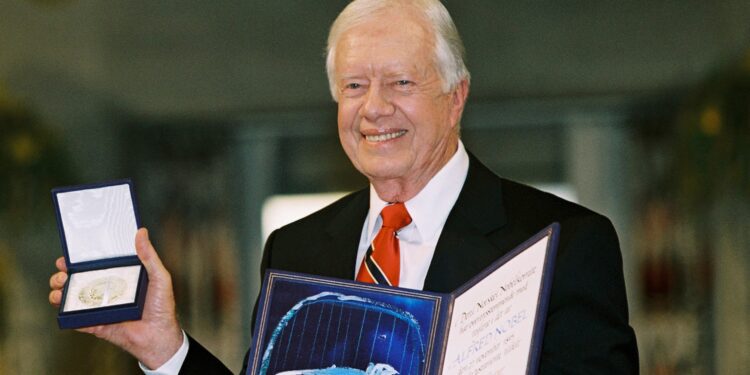[Written by third-party author]
By closely aligning their political identities with ongoing cultural conflicts such as abortion and LGBTQ rights, Republicans—be they moderate, MAGA, influential leaders, or passionate activists—aim to solidify a belief widely accepted in American politics: being a devoted Christian equates to being a conservative, and that faith underpins conservatism.
This presents a significant challenge for those who value the impact of faith in American society. The legacy of former President Jimmy Carter should motivate us to reflect and take action, especially in light of his passing today at the age of 100.
As an individual of faith, I have been taken aback by the decline of Christianity’s status in mainstream America today. After casually mentioning my church to a group of acquaintances, I was met with astonishment—astonishment that I practice Christianity because, as one said, I “seem like a decent person.” I’m not a theologian, but I believe if individuals associate your faith with being a bad human being, something is definitely off. Unfortunately, in recent times, that perception has arguably become representative of mainstream Christianity, causing genuine concern for any believer who cares about the trajectory of our faith.
Pew Research indicates a downward trend in the number of Americans who identify as Christians. Fifty years ago, 90% of Americans labeled themselves as Christians. By 2020, that figure had dropped to just above 60%. It’s important to highlight a rapid 12% decline in just the past decade.
Moreover, the population of Americans identifying as agnostic or atheist has surged from 17% to 26% since 2009. A 2023 column in the New York Times by Nicholas Kristof referenced the authors of the book The Great Dechurching, who stated, “More individuals have departed from church in the past 25 years than all the newcomers who embraced Christianity from the First Great Awakening, Second Great Awakening, and Billy Graham crusades combined.”
I certainly don’t think it’s necessary for every American to identify as Christian. The foundation of our nation is inherently linked to the principle of religious freedom. However, I am concerned about the increasing number of individuals abandoning organized religion, perceiving it as a source of harm. Observing how faith has often been manipulated as a political tool over recent years highlights this issue.
Then came Donald Trump, complicating matters even further. Despite his numerous marriages, infidelities, and public endorsements of sexual assault, Trump somehow emerged as the standard-bearer for the Christian Right.
Explain that one to me, as the younger generations would say.
If Christianity were truly about perfection, I wouldn’t be permitted in any church myself. However, it should embody the pursuit of positive qualities in our daily lives, which include kindness, a generous spirit, moral standards, accountability, honesty, forgiveness, and love.
Jimmy Carter endeavored to live by these principles throughout his public life, often facing ridicule for it. A memorable moment from a Playboy interview, for instance, was his admission that he had harbored lustful thoughts about other women, which he regarded as a form of adultery—today, it seems almost quaint. (He and his spouse Rosalynn had the longest marriage of any First Couple, celebrating 77 years together.)
It’s also true that while many Republicans often emphasize their faith when vying for the GOP nomination, several Democrats only step into a Black church during election cycles. In contrast, Carter was dedicated to teaching Sunday School in his hometown of Plains, Georgia, right up until health issues prevented him from continuing. Unlike numerous former politicians who sought fame and fortune, he found purpose in carpentry—like a certain famous Christian leader—and devoted decades to building homes for those in need through Habitat for Humanity.
Carter was succeeded in the White House by Ronald Reagan, who, despite having initially supported gay rights and abortion access as California’s governor, became a conservative icon through his alliance with the Christian Right. This narrative took hold and still prevails in politics: proud Christians align with conservatism. Bill Clinton’s disgraceful conduct and lack of remorse during the Lewinsky affair seemed to support this idea, but it was also during this time that the hypocrisy of numerous Christian conservatives became evident. Many ardent critics of Clinton harbored similar faults themselves. (Did I mention Newt Gingrich?)
In my documentary Reversing Roe, evangelical figures asserted that abortion was essentially the foremost political issue, eclipsing all others. (For me, interpreting my faith as one that celebrates a 13-year-old rape survivor being compelled to give birth because politicians claiming to be Christians believe she should is particularly troubling.) However, let’s concede they were justified in supporting Trump in 2016. How do they rationalize their loyalty to him now, while Mike Pence, who is generally regarded as more devout than Trump, is jeered at a conservative Christian event for adhering to his faith standards on January 6, 2021?
A diverse coalition of clergy, including Rev. Martin Luther King, Jr. and Christian representatives of various races, spearheaded the Civil Rights Movement in America. It is time for Christians who do not resonate with figures like Donald Trump to reclaim our faith and endorse candidates from all parties who genuinely reflect the teachings of our faith, rather than those who merely pay lip service.
Just imagine how much more improved our world could be if our leaders exemplified the values of Jimmy Carter as he did so brilliantly, rather than merely paying lip service.


